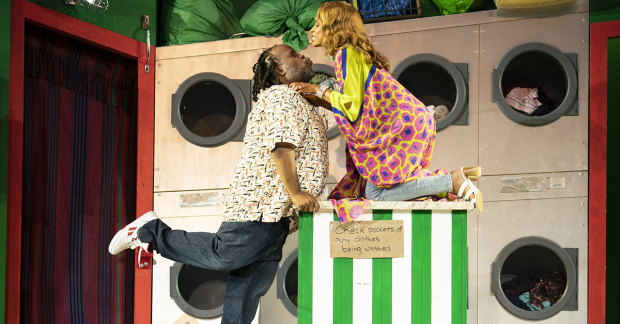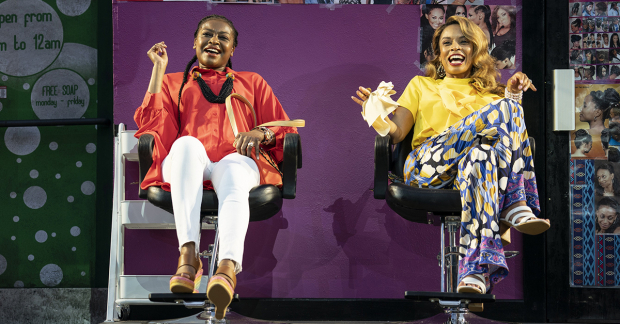Review: Shakespeare in the Park Merry Wives Is a Gift of Black Joy

(© Joan Marcus)
From the first beat of the drum, the Public Theater's free Shakespeare in the Park production of Merry Wives commanded my attention. Farai Malianga, a percussionist from Zimbabwe, fills the Delacorte Theater with passion and pride as he plays on the Djembe, a symbolic drum that is the heartbeat of West Africa. In an act of call and response, he welcomes back an audience for the first production at the Delacorte since the summer of 2019.
In the beginning, Merry Wives was met with multiple hiccups. The play's first preview was canceled because of a thunderstorm. A few weeks later, leading man Jacob Ming-Trent, who spectacularly plays Falstaff, sustained an injury during a performance, bumping the official opening night from the end of July to the beginning of August. And just a few days after that, the Public Theater shared in a series of tweets that several shows would be canceled after a member of the production tested positive for Covid-19. But while everything that could go wrong did, nothing could stop Merry Wives from being a witty, laugh out loud, gift of Black joy and flair wrapped in a New York style bow.
Adapted from Shakespeare's The Merry Wives of Windsor by Ghanaian-American playwright Jocelyn Bioh, and directed Kenyan-born by Saheem Ali, Merry Wives shows us that Shakespearean reimaginings can successfully engage a modern audience and prove their relevance. The text of Merry Wives, for the most part, remains in the language of Shakespeare, but is eased with West African dialects and Harlem street talk that native New Yorkers would quickly grasp.
At the center of the plot is the arrogant and manipulative Falstaff (Ming-Trent), who tries to scam his way into making two rich, married woman, Madam Page (Pascale Armand) and Madam Ford (Susan Kelechi Watson), fall in love with him to insure his wealth.
"Couldn't go to the clubs. Couldn't hit up the bars. Liquor stores was closed all early. Been stuck in the house just eating snacks. Watching Netflix.… So can you blame me for tryna get with Madam Page and Madam Ford?" Falstaff hilariously asks in reference to the ongoing pandemic. Though, Falstaff became nauseatingly relatable and entertaining as he seeks validation and constantly yearns for all eyes on him, it's the women of this play that command the stage.

(© Joan Marcus)
Watson has brought tears to our eyes every season of This Is Us, but paired with Armand, their characters create moments of comedic highlight reels that will never leave my memory. Shola Adewusi's performance as Mama Quickly was magnetic. As the nosey neighbor on the block she connected to every character with comedy and pizazz. Shallow, played majestically by Julian Rozzell Jr., reminded me of the village griot. He was regal from his dress to his walk, as if straight from the African council of elders. The ensemble, consisting of 18 Black artists, some hailing from Nigeria, Ghana, Senegal, and Liberia, seem like old friends. Their theatrical synergy was effortless as they often performed in unison feeding off of each other's energies.
Set in the African diaspora community of South Harlem, Bioh's Merry Wives is a far ways from Windsor. Dede Ayite makes smart choices with the costume design, sticking to eye-catching African traditional dress and mixing it with a side of New York street wear that reminded me of fashion's long multi-cultural history in Harlem. Set designer Beowulf Boritt emerges you into the historic neighborhood with beautifully crafted laundromat featuring working washers, a Senegalese hair braiding salon with photos of Black women in twists and cornrows cut-and-pasted together to cover the doors of the storefront, and an urgent care facility with the words "Black Lives Matters" etched on the side of the building. The audience is immediately made to feel like a part of this neighborhood.
Aside from what immediately catches the eye, it's the smalls details, which urge you to look a little closer, in Borrit's design that make it even more poignant. Written inside the "V" of Black Lives Matter, is 8:46, the national symbol of police violence that is associated with the murder of George Floyd, who was killed by police in March 2020. A cut out of Breonna Taylor's face, another victim of police's overuse of deadly force, beams on one "T" in the phrase. This show quickly becomes a symbol of reflection, but also gives the joy in moving forward.
After the year we've had, reviewing anything that brings some sort of pleasure and reprieve seems silly. The Delacorte is back, people are gathered safely at capacity and experiencing live theater again. The show is free, actors, production, and staff are back to work, and Bioh is helping those often confused or exhausted by Shakespeare experience a fresh take on a classic work that can sometimes seem unintelligible. That in itself made this clever show worth the wait.











